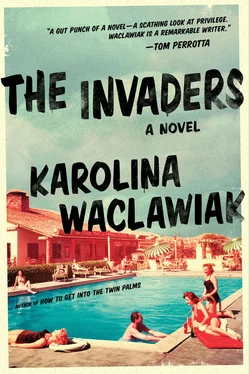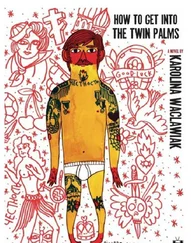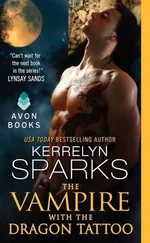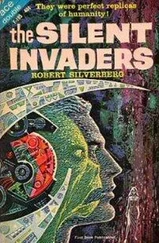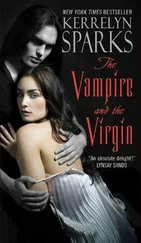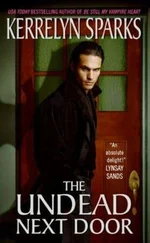“The fence will never hold,” I said.
Another wave crashed and my skin tingled with excitement as I watched the flower beds from next door float away. I stayed pressed close to the window as the house creaked and groaned around me, starting to give way to the oncoming waves.
I could hear Steven’s wheezing breath getting closer. I found Mary and held onto her, running my fingers along the ridges of the robe, feeling the texture of her lips and eyes. I felt the swollen heart on her chest. I opened one of the French doors to let the air in and turned to see the rock in Steven’s hand. His face was full of doubt, but when I nodded to him and stepped out onto the soaked lawn, he hit me in the back of the head as hard as he could. I heard the same crunch I had heard on the nature trail and was suddenly blind with pain. I touched my head and it felt wet and sticky. I turned to look at his moving mouth, but all I could hear was a soft buzzing sound.
The next wave pushed its way into the house and took us both. Our ribs cracked and snapped under the weight of the water as it pulled us out onto the front lawn and out to sea. All around us, the waves ripped open homes and garages, pulling out soccer balls, trash cans and recyclables, wood pieces from projects unfinished, alongside lamps and winter coats, dining-room chairs, expensive kitchen mixers, and IKEA-bought paintings.
At first Steven fought back, and I saw him thrown around, as if weightless. He gasped for air as his arms crashed through the water. I wanted to tell him to stop resisting, to just submit. Instead, I kept my mouth closed as long as I could and let the water carry me. He swam against the current, back toward home, as I floated out to sea, past large black garbage cans and hollow plastic bowling pins, children’s toys and all the detritus of our lives. I watched it all, pain in my head, blood clouding my eyes.
The water rose through the tennis courts, ruining all of the repairs. It made the golf carts that had been tied up with chains float like buoys. In the marshes, the only things that were unharmed were the tall posts with the bird nests atop them. The egrets watched as the water rose up around them and they rose up in kind, gliding through the sky. The water completely submerged the graffitied rocks and rolled over the trolley bridge like it was nothing.
Our yards eroded into the sound as the concrete wall that had kept the water at bay for generations broke into pieces and floated away. Whole gardens disappeared, and soon after our houses joined them. The homes with the best views came apart as if they were made from glued-together balsa wood, crashing down on themselves. The fence went next. Long, white, and plastic, it jerked and spilled right into the murk.
I felt a tangle of seaweed around my ankles as my arms slipped under and then I let the water envelop the rest of me, down into small tornadoes of glittering broken glass. As the waves crashed and receded, I knew I could finally disappear.
The idea for The Invaders has taken many incarnations over the years and the themes in the novel have been burrowing away in me for so long I’m not sure what I’ll do now that I’ve let them out.
First and foremost, I want to thank my wonderful and remarkably generous teachers and fellow students in the Columbia MFA program, including Sam Lipsyte, Christine Schutt, and Gary Shteyngart, who helped me grow as a writer.
Second, Heidi Julavits, Ed Park, Vendela Vida, Andi Winnette, Casey Jarman, Andrew Leland, Ross Simonini, and my entire Believer family whose direction and dedication helped me become a better writer through learning how to be an editor. I learned from the best.
I would like to thank Kirby Kim for always being on my team and Ron Hogan for his wise edits.
A number of brilliant and kind people read drafts of this novel and gave me invaluable advice and support during the process. They are: Dominika Waclawiak, Jennifer Gann, Roxane Gay, Randa Jarrar, Anisse Gross, Iman Saleh, Diane Cook, Megan Abbott, Sara Gran, Libby Burton, Mark Waclawiak, Janne Darata, Natasha Stephan and my mom. Thanks to Jen Cox, Alyssa Barrett, John McElwee, and Lee Ellis for their general moral support.
My mother and father inspire me every day and I thank them for all of their help, especially my badass mother, who is the kind of woman I aspire to be.
Finally, immense gratitude to Jon DeRosa who is always my first and last reader and is someone I am lucky to know. I am constantly in awe of your talent and curiosity. Thanks for everything.

AUTHOR PHOTOGRAPH BY ERIC BURG
KAROLINA WACLAWIAK’s first novel, How to Get Into the Twin Palms, was a New York Times Editor’s Choice, Salon’s “Most Underrated Novel of 2012,” and was selected for New York magazine’s summer reading list. Her work has appeared in the New York Times, Los Angeles Times, The Rumpus , and The Believer (where she is the essays editor). Waclawiak received her BFA in Screenwriting from the USC School of Cinematic Arts and her MFA in Fiction from Columbia University. She lives in Los Angeles.
